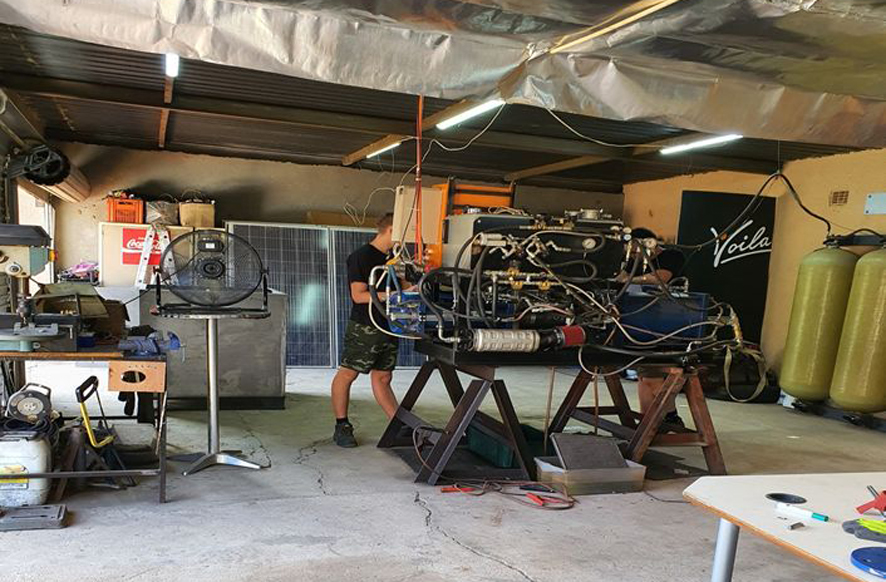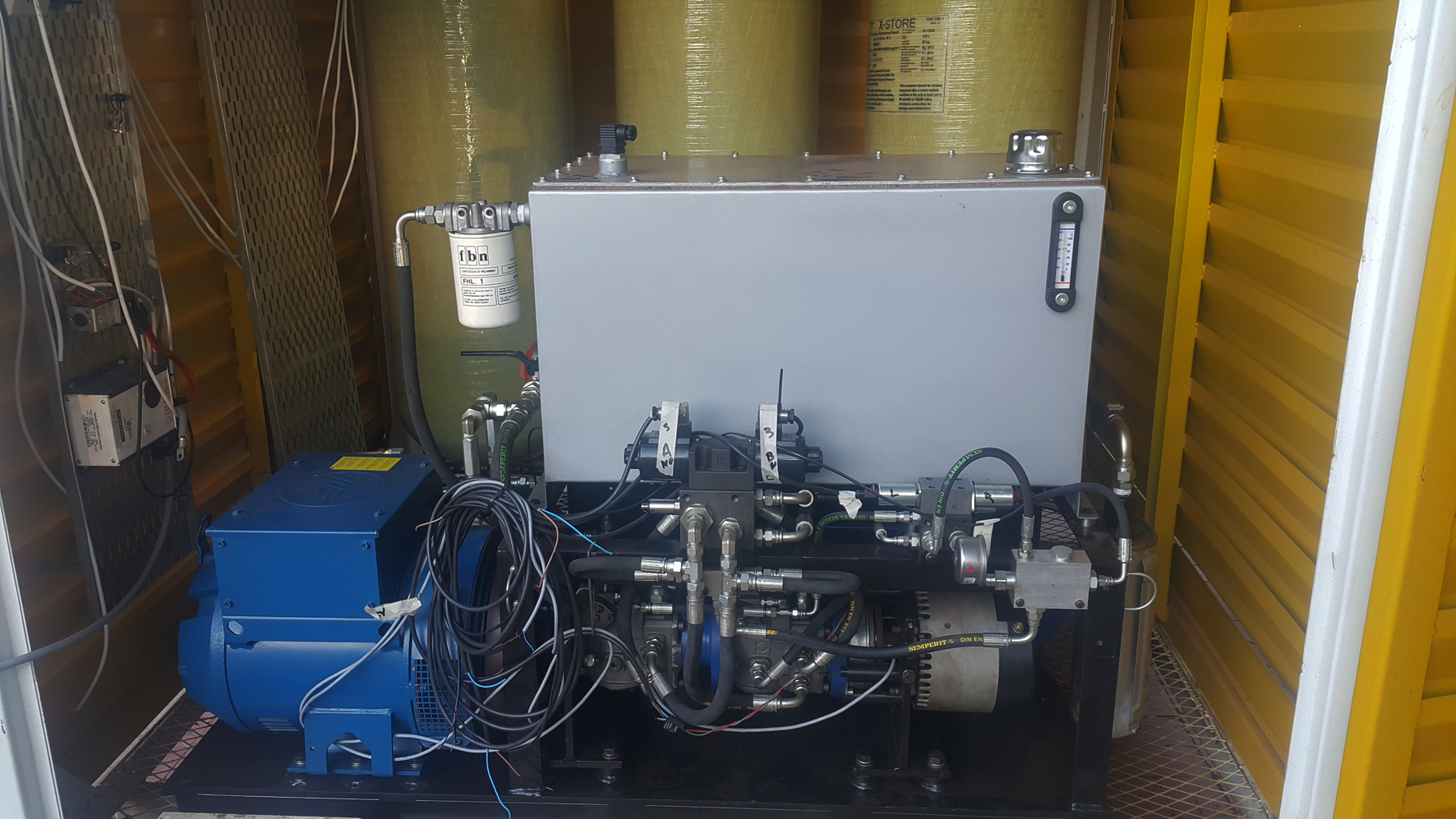 Leaper Innovative Green Energies Air Battery
Development of an innovative energy storage system that generates clean water as a by-product
Leaper Innovative Green Energies Air Battery
Development of an innovative energy storage system that generates clean water as a by-product

Challenges
Many African countries, including South Africa, have a high demand for stable energy and long-term energy storage, as well as clean water sources. However, the electricity access rate in sub-Saharan Africa, at 43 percent, is the lowest of all the world’s regions and corresponds to less than half of the global access rate (87 percent). Medium and large energy users in the region thus face many challenges. A disruption in either energy or water supplies directly affects the proper functioning of both public infrastructures (such as hospitals and schools) and productive sectors.
To deal with power shortages, these entities use generators and/or battery-storage systems. Yet, these alternatives have high operating costs and are generally inadequate because they only cover minimal infrastructural requirements. They are hence only short-term solutions. At the same time, changing climatic conditions, increasing populations and production bases, including agriculture, are putting pressure on the scarce water resources available.
Towards a Solution
Leaper Innovate Green Energies (LiGE) is an award-winning South Africa-based engineering company that designed, developed and patented (in South Africa, Africa and Europe) an innovative energy-storage system: the LiGE Air Battery. The LiGE Air Battery converts any form of energy, including solar, wind and grid, without using chemicals and stores it as compressed air which can be released anytime to produce clean power on demand. The system generates distilled water as a by-product, which can be used for irrigation, cleaning and other applications as it contains no chemicals or ionization. A 50-kWh storage system can produce approximately 700 litres of clean water per day, without requiring a water source such as streams, rivers or oceans. While providing a cost-effective, clean and stable energy power, the LiGE Air Battery also removes particulates and CO2 from the air, replacing them with uncontaminated air.
This initiative is implemented by LiGE and supported by South Africa’s Technology Innovation Agency, South Africa’s Department of Trade and Industry, the Innovation Hub, Magriet Leaper and Warwick Leaper.
Through South-South cooperation, LiGE worked with experts from Eswatini to create a super compressor which could not only store compressed air for later use as on-demand energy, but could effectively compress the humidity in the air and generate clean water from the air in significant quantities. The system is designed to be transportable, scalable, clean with no chemicals and have at least a 30-year lifespan. The solution can provide medium and large energy users with the ability to store energy at low cost and utilize it during high-peak periods.
The LiGE Air Battery outperforms all other storage systems in most of the critical success parameters, such as lifespan, efficiency, charge and discharge cycles and cost per kWh generated. It offers a savings of approximately 65 percent on the electricity bill of large energy users and its performance does not deteriorate during its 30-year lifespan. The system has zero-carbon footprint and does not utilize toxic components or rare earth metals in its manufacture and operation. All its parts are recyclable, with no materials going to landfill.
This LiGE technology won the 2015 World Wildlife Fund-South Africa Climate Solver Award and the 2019 Southern African Startup Award and was among the finalists of several other innovation competitions. It was the only African solution featured in the recent Cleantech Global Survey for long-term energy storage.
The system has been tested and is in daily use at the company’s factory. Delayed by the negative impacts of the COVID-19 pandemic, the last R&D milestone should be accomplished in 2021 as the project moves to commercial status. This solution can be piloted in other African countries that require stable cost-effective energy storage and/or clean water. The solution’s market response has been promising, with orders coming in from all around the world (about 40 percent of which are from the Global South, notably Cambodia, Egypt, Kenya and South Africa). More specifically, various energy departments and energy suppliers of several African countries, including Burkina Faso, Eswatini, Ghana, Kenya, Nigeria, Senegal, South Africa and the United Republic of Tanzania, have expressed considerable interest to pilot the systems and, if successful, to explore manufacturing possibilities in those countries to help solve their energy issues. The next step for this solution is to identify manufacturing partners in different continents to scale up capacity to face the increasing demand for clean storage and clean water. At the same time, South-South technology transfers could allow its innovation to become a key component of comprehensive energy solutions to ensure more environment-friendly and reliable power provision in developing countries.
Contact Information
Countries involved
Supported by
Implementing Entities
Project Status
Project Period
URL of the practice
Primary SDG
Secondary SDGs
Similar Solutions
| NAME OF SOLUTION | Countries | SDG | Project Status | |
|---|---|---|---|---|
Accelerating the Transformational Shift to a Low-Carbon Economy in Mauritius Towards supplying 35 percent of the country’s energy needs with renewables by 2025 |
Eswatini, South Africa | 05 - Gender Equality 09 - Industry, Innovation and Infrastructure 13 - Climate Action | Ongoing | View Details |
Accelerator Labs Network Following collective intelligence methods to address emerging sustainability challenges and the growing demand for local solutions |
Eswatini, South Africa | 08 - Decent Work and Economic Growth 13 - Climate Action | Ongoing | View Details |
Accessible Dictionary Inclusive Dictionary for all |
Eswatini, South Africa | 09 - Industry, Innovation and Infrastructure | Completed | View Details |
Adaptation for Smallholder Agriculture Programme Establishing better working conditions for smallholder farmers through the use of good practices and new technologies |
Eswatini, South Africa | 08 - Decent Work and Economic Growth 11 - Sustainable Cities and Communities 13 - Climate Action 15 - Life on Land | Ongoing | View Details |
Addressing Racial and Ethnicity-based Discrimination and Strengthening the Protection of Rural Afro-descendants UNFPA supports data disaggregation as a tool to fight racism and ethnic discrimination |
Eswatini, South Africa | 01 - No Poverty 02 - Zero Hunger 03 - Good Health and Well-being 05 - Gender Equality 06 - Clean Water and Sanitation 11 - Sustainable Cities and Communities 16 - Peace and Justice Strong Institutions | Ongoing | View Details |

